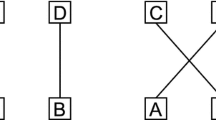Abstract
Tim Maudlin has claimed that EPR’s Reality Criterion is analytically true. We argue that it is not. Moreover, one may be a subjectivist about quantum probabilities without giving up on objective physical reality. Thus, would-be detractors must reject QBism and other epistemic approaches to quantum theory on other grounds.
Similar content being viewed by others
Notes
Whether the Reality Criterion is needed to make EPR’s point is another question. In his own (individual) presentations of the argument, Einstein does not include the Reality Criterion, which may cast doubt on his commitment to the principle (Fine 1986, p. 62).
It should be noted that the broad reading of “epistemic” taken here avoids the factive connotation usually associated with knowledge (e.g., Timpson 2008, Sect. 2.3). Alternatively (and more precisely), one could characterize QBism and related views as doxastic approaches to QM (e.g., Boge 2018, Sect. 7.2; DeBrota 2018).
A distinction may be drawn between the outcome of a measurement and a physical quantity taking a particular value. As stated, RC concerns only the latter, which may render it inapplicable on certain interpretations of QM (see Healey 2017, p. 101).
Note that the subjectivist needn’t deny the existence of all physical properties of a system to reject RC, but only those that are both (a) attributed on the basis of a probability one statement from QM and (b) determine the outcome of a future measurement. They may, for instance, attribute physical properties to a system associated with its preparation, but such properties will meet neither condition. Preparation procedures may be described without appeal to QM and the laws are indeterministic with respect to preparations and measurement outcomes.
We assume that if an event is determined to occur by some actual event, then it must occur. Of course, different laws of nature might allow for a determined event not to occur, so the necessity involved is physical or nomological.
Thanks to an anonymous referee for bringing this work to our attention.
References
Bell, J. S. (1964). On the Einstein Podolsky Rosen paradox. Physics Physique Fizika, 1(3), 195.
Boge, F. J. (2018). Quantum mechanics between ontology and epistemology, Volume 10 of European Studies in Philosophy of Science. Cham: Springer.
Brown, H. R. (2019). The reality of the wavefunction: Old arguments and new. In A. Cordero (Ed.), Philosophers Look at Quantum Mechanics (pp. 63–86). Cham: Springer.
Brukner, Č. (2018). A no-go theorem for observer-independent facts. Entropy, 20(5), 350.
Caves, C. M., Fuchs, C. A., & Schack, R. (2007). Subjective probability and quantum certainty. Studies in History and Philosophy of Science Part B: Studies in History and Philosophy of Modern Physics, 38(2), 255–274.
DeBrota, J. B., Fuchs, C. A., & Stacey, B. C. (2018). Symmetric informationally complete measurements identify the essential difference between classical and quantum. arXiv:1805.08721.
Einstein, A., Podolsky, B., & Rosen, N. (1935). Can quantum-mechanical description of physical reality be considered complete? Physical Review, 47(10), 777.
Fine, A. (1986). The shaky game. Einstein and the quantum theory. Chicago: The University of Chicago Press.
Frauchiger, D., & Renner, R. (2018). Quantum theory cannot consistently describe the use of itself. Nature Communications, 9(1), 3711.
Friederich, S. (2015). Interpreting Quantum Theory: A Therapeutic Approach. Basingstoke: Palgrave Macmillan.
Fuchs, C. A. (2017). On participatory realism. In I. T. Durham & D. Rickles (Eds.), Information and interaction: Eddington, wheeler, and the limits of knowledge (pp. 113–134). Cham: Springer.
Fuchs, C. A., Mermin, N. D., & Schack, R. (2014). An introduction to QBism with an application to the locality of quantum mechanics. American Journal of Physics, 82(8), 749–754.
Healey, R. (2017). The quantum revolution in philosophy. Oxford: Oxford University Press.
Healey, R. (2018). Quantum theory and the limits of objectivity. Foundations of Physics, 48(11), 1568–1589.
Leegwater, G. (2018). When Greenberger, Horne and Zeilinger meet Wigner’s Friend. arXiv:1811.02442.
Lewis, P. J. (2019). Bell’s theorem, realism, and locality. In A. Cordero (Ed.), Philosophers look at quantum mechanics (pp. 33–43). Cham: Springer.
Maudlin, T. (2014). What Bell did. Journal of Physics A: Mathematical and Theoretical, 47(42), 424010.
Norsen, T. (2016). Quantum solipsism and non-locality. In M. Bell & S. Gao (Eds.), Quantum nonlocality and reality: 50 years of Bell’s theorem (pp. 204–237). Cambridge: Cambridge University Press.
Pusey, M. F., Barrett, J., & Rudolph, T. (2012). On the reality of the quantum state. Nature Physics, 8(6), 475.
Stairs, A. (2011). A loose and separate certainty: Caves, Fuchs and Schack on quantum probability one. Studies in History and Philosophy of Science Part B: Studies in History and Philosophy of Modern Physics, 42(3), 158–166.
Timpson, C. G. (2008). Quantum Bayesianism: A study. Studies in History and Philosophy of Science Part B: Studies in History and Philosophy of Modern Physics, 39(3), 579–609.
Werner, R. F. (2014). Comment on ‘What Bell did’. Journal of Physics A: Mathematical and Theoretical, 47(42), 424011.
Williamson, T. (2007). How probable is an infinite sequence of heads? Analysis, 67(3), 173–180.
Acknowledgements
F. J. Boge was employed with the research unit The Epistemology of the Large Hadron Collider (German Research Foundation (DFG); grant FOR 2063) while working on this paper, and hence acknowledges the funding. We otherwise thank Richard Healey and John DeBrota for helpful comments on an earlier version of this paper, as well as Chris Fuchs for discussions on the subject at the Stellenbosch Institute for Advanced Study.
Author information
Authors and Affiliations
Corresponding author
Additional information
Publisher's Note
Springer Nature remains neutral with regard to jurisdictional claims in published maps and institutional affiliations.
Rights and permissions
About this article
Cite this article
Glick, D., Boge, F.J. Is the Reality Criterion Analytic?. Erkenn 86, 1445–1451 (2021). https://doi.org/10.1007/s10670-019-00163-w
Received:
Accepted:
Published:
Issue Date:
DOI: https://doi.org/10.1007/s10670-019-00163-w



